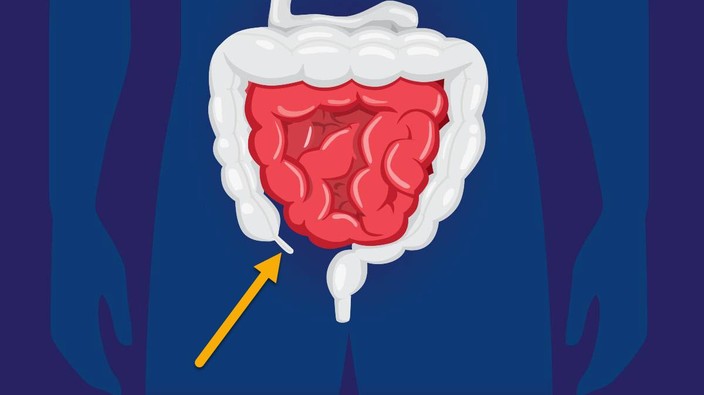one of the strangest parts of the human body, the appendix has confounded doctors for centuries. the mysterious organ is a two to four inch, worm-shaped tube that sits between the small intestine and large intestine in your lower right abdomen.we are all born with an appendix, and there does not appear to be any adverse health effects when it is removed. so what does it actually do? is it the remnant of a once vital organ that has lost its function over generations? does it aid in gastrointestinal issues? is it the skeleton key to all of life’s great mysteries? the short answer is: we don’t really know.there is a
theory that the appendix acts as a ‘safe house’ for the beneficial bacteria that lives in the gut. “while there is no smoking gun, the abundance of circumstantial evidence makes a strong case for the role of the appendix as a place where the good bacteria can live safe and undisturbed until they are needed,” said william parker, ph.d., assistant professor of experimental surgery at duke university, as part of a study done in 2007.the science on that theory is not completely settled, but we do know that, despite its seemingly lack of purpose, the appendix can cause some serious health conditions. in fact, it’s notorious for becoming inflamed and infected, resulting in appendicitis.according to the
mayo clinic, appendicitis — which can result in severe pain and is a medical emergency — tends to occur in people between the ages of 10 and 30, though it can happen to anyone.
symptoms pain from appendicitis usually starts around the navel and often shifts to the lower right side of the abdomen. pregnant women may experience the pain the upper right side of the abdomen as the appendix moves during pregnancy.
other symptoms can include nausea, fever, loss of appetite, constipation, diarrhea, bloating and pain that worsens when you cough or move suddenly.
enjoying this story? subscribe to our newsletter here
the inability to pass gas is also a common symptom since appendicitis is often the result of an obstruction that has blocked the small opening of the appendix. the blockage causes the bacteria in the appendix to grow out of control, making the organ fill with pus and swell and cause pain.
diagnosis: appendicitis doctors often
suspect appendicitis based on symptoms, medical history and a physical exam — although an ultrasound or x-ray is needed for a definitive diagnosis .
risks like most health problems, the earlier appendicitis is treated, the less risky it is. the
chances of death are very low, as long as surgery happens quickly — without surgery or antibiotics, more than 50 per cent of people with appendicitis die. when the appendix becomes inflamed or infected and swells, it can burst or rupture if left untreated. when this happens, the ruptured appendix spreads the infection throughout the abdomen, potentially infecting the lining of the abdomen called the peritoneum. a peritoneum infection can lead to sepsis, a serious condition that can be life-threatening if not treated right away. while a ruptured appendix was
often fatal just decades ago, the death rate has been lowered to nearly zero with operations and antibiotics.
treatment when it is determined that appendicitis has occurred, and the appendix hasn’t burst,
the most common treatment is to remove the appendix (an appendectomy). it is a routine procedure in which a surgeon makes a cut through the belly button to remove the infected organ. increasingly, a doctor may opt for antibiotics to treat the infection rather than the surgical option. if the appendix has ruptured, surgery is required to clean up the remnants within the abdomen. if intervention was early,
a patient can usually leave the hospital in one to three days and recovery is short.
what are the odds you will develop appendicitis?according to johns hopkins, a family history of appendicitis may raise your risk, especially for men, while for a child, having cystic fibrosis may increase the likelihood of developing appendicitis. a 2003
study on appendicitis in ontario found that “the annual age and sex-adjusted incidence of acute appendicitis was 75 per 100,000 population.” the study also found that appendicitis was most common in males between the ages of 10 and 19 in the summer months.
what else? while the appendix is most famous for appendicitis, rarely, it can also be affected by other diseases, such as cancer.
according to the national organization for rare disorders (nord), cancers and tumours (neoplasms) of the appendix are extremely rare with an estimated incidence of 0.15 to 0.9 per 100,000 people.
nick beare is a writer with healthing.ca.
